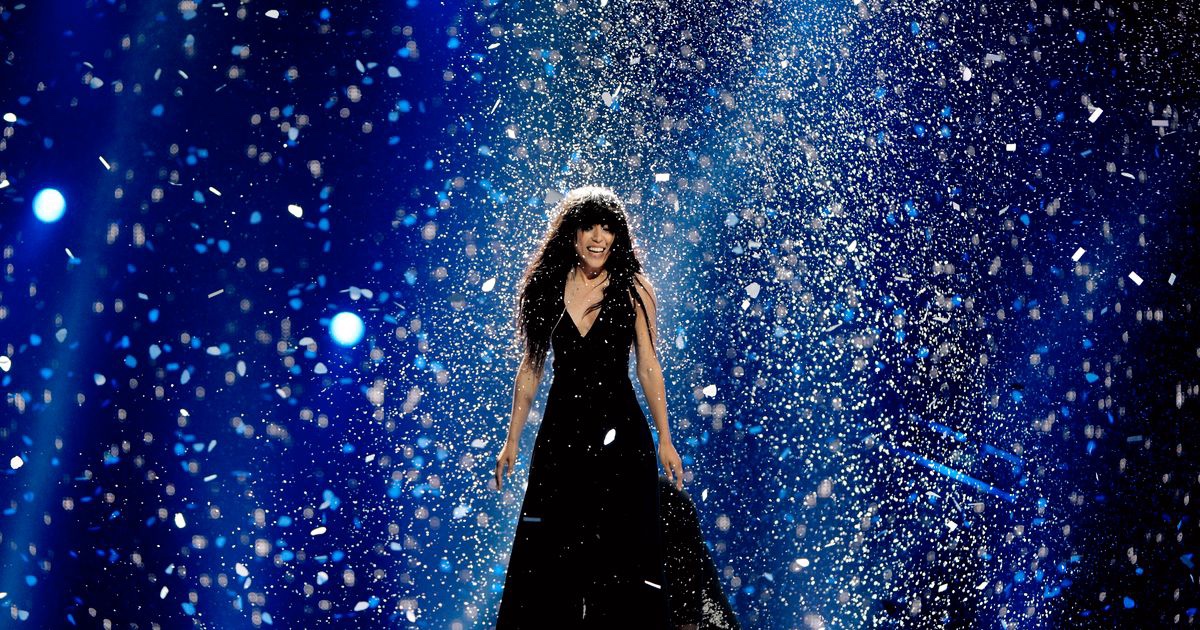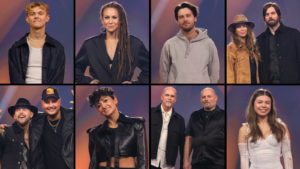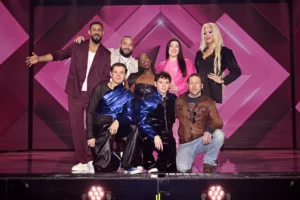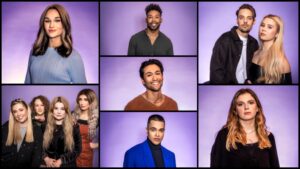Image Credit: Jessica Gow
Back in 2012, Loreen asked us ‘Why can’t this moment last forever more?” – and little did she know that the moment would. That moment is of course ‘Euphoria’, the winning song of that year and to this day one of the most recognisable Eurovision winners ever.
There was no way of telling back then how much ‘Euphoria’ and Loreen would leave a lasting legacy on the contest. Now, as we look towards a potential 2nd win for Loreen in the 2023 contest with ‘Tattoo’, we explore how her song transformed Eurovision into the contest we know it to be today.
A Brief History of Sweden in Eurovision
Sweden have been taking part in Eurovision since 1958 and have been a constant competitor since 1977. They have won on the following 6 occasions:
- 1974: ABBA – ‘Waterloo’
- 1984: Herreys – ‘Diggi-Loo Diggi-Ley’
- 1991: Carola – ‘Fångad Av En Stormvind’
- 1999: Charlotte Nilsson – ‘Take Me To Your Heaven’
- 2012: Loreen – ‘Euphoria’
- 2015: Måns Zelmerlöw – ‘Heroes’
Aside from this, Sweden have come top 5 in Eurovision on 26 occasions, and are the only country to consecutively host the contest in 5 different decades (having won in 1975, 1985, 1992, 2000, 2013 and 2016).
Sweden’s History Prior to ‘Euphoria’ in the 2000s
In the early to mid-2000s Sweden did relatively well, only placing outside of the top 10 in 2005 and coming 5th on four occasions. However, as the 2000s reached their later years, Sweden’s fortunes began to change. In 2007, The Ark came 18th, as did Charlotte Perrelli in 2008, who wouldn’t have qualified if the backup juries hadn’t selected ‘Hero’ as their qualifier. Malena Ernman came 4th in her semi-final but only 21st in the final, meaning Sweden ended the decade in a less than glorious way compared to how they ended the 1990s. Things only got worse in 2010, when Anna Bergendahl became their first – and to this date only – non-qualifier, missing out on the final by just 5 points to Cyprus, putting them 11th in the semi-final. They were a qualifier with the televote in 9th place, but unfortunately 11th with the jury, pushing them out of the final that year.
In 2011 however, something seemingly shifted. Eric Saade – who attempted to represent Sweden the year prior with ‘Manboy’, coming 3rd overall in Melodifestivalen – returned again, this time with ‘Popular’. He won both the contest and the right to represent Sweden at Eurovision that year in Düsseldorf, Germany. ‘Popular’ was a slick, catchy, well-choreographed pop tune – one extremely representative of not only Sweden’s pop music industry but also the European pop industry at the time – and was an instant favourite to win the contest. Overall, ‘Popular’ won its semi-final and came 3rd in the final – taking Sweden back to the top 3 for the first time since 1999, and charting in Austria, Belgium, Finland, Germany, Ireland, the UK and of course, Sweden, after the contest. Norway’s 2012 entry ‘Stay’ by Tooji is often cited as hugely influenced by ‘Popular’, with a similar performance and styling for Tooji, although it did significantly worse, coming last.
Melodifestivalen 2012
Coming off the back of a great result, the entries in Melodifestivalen 2012 needed to be quality to continue the newfound success Eric had brought to Sweden the year prior. When the artists were announced, it seemed as though there was just one artist that was going to Baku – and that wasn’t Loreen. Instead, it was Danny Saucedo, who had two very good Melfest results under his belt already. As a member of E.M.D, their song ‘Baby Goodbye’ came 3rd in the 2009 contest, and in 2011 his song ‘In The Club’ came 2nd. He was last to perform in Heat 4 (a position well known to viewers as the “one to watch” in the contest) and his song ‘Amazing’ was a natural successor to ‘Popular’. It had a well-choreographed routine, an infectious uptempo beat and LED outfits (which ended up being the inspiration for the UK’s Electro Velvet in 2015), as well as being delivered by someone the public knew could give a solid and reliable performance. It should’ve been an easy path to the songbird trophy.
However, Heat 1 featured someone who wasn’t necessarily seen as an outright contender – and that was Loreen. She had also competed the year prior with ‘My Heart Is Refusing Me’, losing out in the first round of Andra Chansen (the second chance round for Melfest). ‘Euphoria’ was performed last in Heat 1 of the contest: a dark, synth-pop track, with a consistent build throughout to the final chorus – it was a true reflection of modern chart music. The song was written by Thomas G:Son and Peter Boström, two successful writers in the Melodifestivalen and Eurovision sphere. It was no surprise that it won the heat overall with 160,351 votes. Danny also won his heat but with 223,227 votes so at this point, ‘Amazing’ was definitely looking to be the one represent Sweden at Eurovision…until the final.
The international jury gave Loreen 114 points compared to Danny’s 92, and the televote gave ‘Euphoria’ 154 points compared to ‘Amazing’s’ 106 – meaning Loreen was off to Eurovision. Loreen received a total of 212,163 more votes than Danny (670,551 compared to 458,388). At the time, this was the highest televote in history in Melodifestivalen, which has now since been surpassed due to the changes in voting and ever-growing popularity of the contest – though Loreen still holds the record, with the 3.7 million votes she received in 2023 now the highest amount received in the final, even overtaking Anders Bagge’s 3.4 million in 2022. When told in 2012 about the voting record, she said:
I don’t know what to say, I’m so happy. This is something we have created together you know, the result could have been the opposite but I think people could understand my message and were able to connect to it. It wasn’t just about me and what I did up on stage.
Loreen, SVT

Despite the Swedish public and Eurovision fans alike being relatively happy with ‘Euphoria’ winning, Danny himself wasn’t. He stormed out of the Globen when he lost, refusing to sit through the winners reprise telling Swedish press that “he just wanted out”. Danny also revealed he had been offered ‘Euphoria’ before Loreen, saying:
“Euphoria” was a real hit song when it came to me. Loreen did a great version and a magical job. It would have sounded in a completely different way with me, and it is not at all certain that my version even made it further in Malmö
Danny Saucedo, Aftonbladet (2012)
He also wrote on Facebook about his feelings the day after Melfest ended, expressing his disappointment and belief that ‘Amazing’ would do better than ‘Euphoria’:
It’s kind of like gearing up for Christmas Eve and when it’s time to celebrate with the family, eat well and open presents, the family doesn’t show up, all the food is gone and all the presents with it. It gets very empty and you feel empty and stupid.
I would work better than Loreen, just look at my number, and you’ll see. What Sweden missed was to send a number that has better chances in Europe.
Danny Saucedo, Facebook (2012)
Loreen gracefully responded to Danny’s comments about the contest and her song, avoiding involving herself in the drama that had unfolded:
Danny is at least as good as me, if not equal. Danny is awesome at what he does. He is a perfectionist just like me.
Loreen, Aftonbladet (2012)

Danny did support Loreen when Eurovision 2012 took place and in 2013 was offered the opportunity to host Melodifestivalen. He returned in 2021 as a contestant with ‘Dandi Dansa’, coming 7th. He’s since reflected on his attitude during 2012, telling Aftonbladet in 2021:
It took a very long time to recover, I was angry and bitter. Then I became a presenter the following year, it was a bit strategic because the media image of me was “damn he was bitter, that guy”.
It is clear that I have thought about it, if I were to come last [in 2021] I would be sad. But I think I’m [now] mature enough to have thought “hmm… then there’s something I’m missing or doing that doesn’t really work with what people like”.
Danny Saucedo, Aftonbladet (2021)
Alas, despite Danny’s stream of comments about Loreen’s Melfest win, it was she who would be off to Azerbaijan for Eurovision 2012, and she didn’t let the buzz cloud her view of representing Sweden at the contest. After her win, she told SVT:
I have the motivation, I work very hard. And it’s my responsibility I think, you should always do your best, and I will.
Loreen on representing Sweden, SVT
Loreen’s Activism in Baku
When Loreen got to Baku, she was the only contestant of all 42 to visit human rights groups within Azerbaijan. The contest had come under fire due to its treatment of its citizens during the construction of the Baku Crystal Hall and during the contest’s preparations. The BBC made a Panorama episode about the contest and the connotations of it being hosted in Azerbaijan, which you can watch below:
Loreen’s meeting with these groups was done in cooperation with Sing for Democracy, which is a local campaign using Eurovision to focus on human rights in Azerbaijan, Azerbaijan Human Rights House, Institute for Reporters Freedom and Safety (IRFS), Civil Rights Defenders and Human Rights House Foundation.
During her meeting with these groups, she was introduced to and educated on a various range of topics that troubled Azerbaijan, including property rights, censoring and attacks on journalists and editors, blackmailing, threats against human rights activists and imprisonment of political opponents.

Loreen also visited feminist groups in Azerbaijan, and told reporters why she found it important to visit such groups during her time in the country:
[I’m here] for the reason when it comes to human rights issues, they’re really important. I’ve lived with it beside me, […] I have seen cousins who have been married off young and in Morocco, it is not balanced between men and women. […] These questions have affected me very much, that is the reason I was there [at the feminist group] because I hope that I can inspire all the girls to continue to go there and not forget themselves. Everyone’s story made an impression on me […], I was very pleased with these girls who are not afraid to talk about what they think and what they’ve been through, there is no shame in them. […] There has been no free time for me, the only thing I’ve done is go to the feminist group and some other things and organisations, I’ll do as much as I can. I can change, I can inspire, so use me.
Loreen about visiting groups in Azerbaijan, Swedish Report
Her work in Azerbaijan came under fire from Azeri government officials, who accused her of politicising the contest, and told the EBU to stop her from continuing on with her meetings with these groups. She was defended by Swedish diplomats, who noted that none of her actions were against the contest’s rules, and she was allowed to continue on without any intervention.
Loreen won Läkerol’s culture award “Voice of the Year” for her work in Azerbaijan, winning 100,000 SEK. She donated the prize money to Civil Right’s Defenders in Azerbaijan “so that journalists there get the chance to safely write truths, and for women to be able to go their own way, and have as many rights as men”.
Semi Final 2
At Eurovision, Sweden was drawn to perform in the 2nd half of Semi Final 2, ultimately performing in 11th position, between Croatia’s ‘Nebo‘ by Nina Badrić and Georgia’s ‘I’m A Joker‘ by Anri Jokehadze. ‘Euphoria’ won the semi-final with 181 points (1st in the jury, 145 points / 1st in the televote, 180 points), beating another favourite, Serbia’s Željko Joksimović with ‘Nije ljubav stvar‘. It received 6 sets of 12 points, from Estonia, Germany, Georgia, The Netherlands, Norway and Slovakia. Of the 21 countries eligible to vote in semi final 2, ‘Euphoria’ was in the top 3 of 13 of them, and was the only country to receive points from every country able to vote in that semi final.
Under the 2010-2015 semi final voting system, ‘Euphoria’ is the second highest scoring song in a semi final, beaten only by Sweden’s other winner ‘Heroes‘ by Måns Zelmerlöw, which received 217 points in 2015’s semi-final 2.
The Final
Going into the final, Sweden was the odd’s favourite to win, along with Italy, Russia and Serbia. Loreen was set to perform 18th, after ‘Aphrodisiac‘ by Eleftheria Eleftheriou from Greece and before ‘Love Me Back‘ by Turkey’s Can Bonomo.
‘Euphoria’ was staged completely differently to any of the other songs within that year’s final. Whilst all other acts utilised the grand scale of the Baku Crystal Hall, opting to show the large stage, alongside pyrotechnics and LED backgrounds, Sweden opted for something different. Beginning the performance with strobe lights, the camera focused on Loreen for the first verse, who was lit by just a single spotlight, with the rest of the stage remaining completely black. She continued the performance like this for the whole three minutes, with the bridge seeing “snow” fall down onto her from the ceiling, along with a dancer joining the stage for the final chorus. Whilst in a 2023 contest, ‘Euphoria’ may not seem “impressive” as a staging due to the rise in more complex stage designs and productions over the years, in 2012 this drew you into the performance, as it was rare in that period for a Eurovision staging to be so intimate. For three minutes, viewers were transported directly into Loreen’s world, before returning back to the show again. Alongside her captivating performance and powerful vocal, ‘Euphoria’ was a clear standout within the running order, despite being surrounded by two other upbeat songs. After the contest, Loreen spoke to BBC Breakfast about her staging:
It’s all about focus actually, because there are so many important parts in this performance. I’m standing on a podium and it’s limited so you can fall down, it’s one metre high […] so I didn’t have much of a choice but to shut out everything and focus.
I think that people liked my performance because it’s not usual for Eurovision. Usually, they have big clothes and it’s a lot of lighting, you know it’s ‘maxed’. I had a message, I wanted everything to be simple because today with so much information – you have to be a certain way, you have to look a certain way, and that’s why I didn’t wear any shoes, hardly any makeup, my hair was messy, no lightning, not much at least, you couldn’t really see my face. Just to narrow it down, take it down, make it easy, make it simple, we need that.
Loreen, BBC Breakfast
She took creative control of the performance in Baku, after being dissatisfied with compromising on her performances previously. She said that she faced pushback from people around her, including being told the day before her performance that the ‘siren’ sound introduction to the song would be removed – to which she disagreed:
[The pushback] was never aggressive, but it was still there. Their ideas were like, ‘could you just please wear shoes? Do you really have to be barefoot? Maybe a pair of high heels? Something like that?’. Or, ‘could you just try to turn up the lights so we can see your face? Or change the look?’ – because my fringe was down over my eyes, I don’t understand how I could find my way around the stage. ‘Could we make the song a little bit less spiritual and more happy? Can we just give you more makeup, maybe some red lipstick?’.”
The producer said to me, ‘we can’t have the siren at the beginning’, and I told him, ‘we need the siren at the beginning to neutralise the space’. He said, ‘if you have the siren, you’re going to kill the song’. Basically, I was told, ‘you’re jeopardising the whole thing’. This was very late, I was exhausted, it was just before midnight, and he said, ‘it’s never going to work, Loreen’. And so I said, ‘it’s either the siren or I’m out
[After adding the siren again] I remember thinking, ‘what have I done? What if it doesn’t work?’. You know, all these thoughts you get when you’re really hard on your own intuition.
To [the producers] credit, when he saw the performance he came up to me with tears in his eyes, […] he was like, ‘I don’t know what to say, I’m so sorry, this is so beautiful and it doesn’t even matter if it wins or not’.
Loreen, Huffington Post
At the end of the voting, Loreen received 372 points, the then-second highest ever score for a Eurovision winner, just 15 points shy of Alexander Rybak’s record of 387 points for ‘Fairytale‘ 3 years prior in 2009. ‘Euphoria’ recieved 18 sets of 12 points, which was a record for the contest at the time, matched by Portugal’s Salvador Sobral’s 18 sets of 12 points in the 2017 final televote, and beaten by Ukraine’s Klaush Orchestra’s 28 sets of 12 points in the 2022 final televote. Loreen won both the jury (296 points) and the televote (343 points), received points from all but Italy of the 41 countries eligible to vote for Sweden in the 2012 contest and was in the top 3 for 26 countries. Russia’s Buranovskiye Babushki, who that year entered ‘Party For Everybody‘, were in 2nd place, beaten by a 113-point margin. To this day, ‘Euphoria’ remains one of the standout performances from Eurovision in the 2010’s, and was a clear instant hit for those watching at home.
Immediate Impact
After ‘Euphoria’s win, it reached #1 in 16 countries across Europe, becoming certified Gold in Belgium, Italy and the UK, 3X Gold in Germany, Platinum in Finland, Denmark, (sales) and Spain, 2X Platinum in Switzerland and Denmark (streaming), 10X Platinum in Sweden and 11X Platinum in Norway. By the end of 2012, it appeared 16 year-end charts across 14 countries, remaining at number #1 for Finland and Sweden, and remaining in the top 10 for The Netherlands, Austria, Denmark, Germany and Spain. By the end of 2013, the song appeared in Russia’s Airplay year-end charts.
The success of the song and Loreen saw her win an MTV EMA for ‘Best Swedish Act’, with her debut album ‘Heal’ going to number to #1 in Sweden upon its release. It also received a music video, released after the contest in July 2012, which currently has 53 million views at the time of writing.
In 2013, Loreen said that ‘Euphoria’ changed her life, and that she used the fame she recieved after the contest to be heard and to change things, allowing her music to unite people. She also commented on the significance of the Butterfly symbol and the ‘We Are One’ slogan that was chosen for the contest:
I’m very very happy and also thankful for [the form of] this year’s Eurovision, that case to decide to call it ‘We Are One’ just to follow up what we created in Baku. It’s human rights, and [the creators of the slogan] also saw Eurovision as an opportunity to make a change. I would say for me it’s a symbol of rights, it’s a symbol of freedom, it’s a symbol of a lot of things that are good, that’s why it’s a butterfly.
Loreen, Eurovision.TV
At the 2013 contest, ‘Euphoria’s impact saw a rise in the more synth/electronic pop sound: Belgium, Ireland, Norway and Slovenia all went for more chart-hit sounding entries, with Sweden continuing on with their new pop-powerhouse status with ‘You’ by Robin Stjernberg. However, most notably the biggest influence of ‘Euphoria’ in the entries came from Germany, who sent Cascada with ‘Glorious’. This song was subject to intense plagiarism accusations, seeing Germany’s broadcaster commissioning a “musical audit” that would examine the claims ‘Glorious’ had copied ‘Euphoria’. Natalie Horler of Cascada insisted that they were two different songs, whilst the head of entertainment of NDR had noted that claims happen every year, and that ‘Euphoria’ had been likened to songs by Rihanna and David Guetta. Thomas G:Son and Peter Boström were also questioned on the similarities, with G:Son commenting:
When the German authorities indeed believe that it may be plagiarism of one of our songs, they can investigate that. It’s their right to do so. In general, pop songs are alike. […] We definitely feel honoured. It’s not plagiarism to us, however. If you look at the composition in waveform, you will see that 10,000 pop songs have similar courses.
Thomas G:son, Bild
Germany were allowed to compete with ‘Glorious’ at Eurovision, and despite being a pretty big favourite at the time, it came in 21st place.
Aside from this, 2013 was also the first year Sweden were able to host the contest since its expansion in the 2000s, and the production from SVT is noted as one of the best in recent years. Host Petra Mede is seen as one of the most popular modern contest hosts, even being invited to host Eurovision’s Greatest Hits celebration on the BBC in 2015, and returning to host the contest again alongside Måns Zelmerlöw in 2016. SVT also re-introduced the flag parade, and changed the postcards to personally reflect the artists, rather than advertising different elements of life within the host country. Both of these changes still continue to this day. Loreen returned to perform ‘Euphoria’ and her new single ‘We Got The Power‘ at the contest.
An Everlasting Piece of Art – The Lasting Legacy of ‘Euphoria’
Alongside winners such as ‘Satellite‘ by Lena in 2010 and ‘Fairytale’ by Alexander Rybak, ‘Euphoria’ managed to push the contest in the direction of becoming a respected music contest again It encouraged countries to look inward at their own music industries and pick songs less ‘made for Eurovision’, and instead look for songs with a modern sound and feeling of authenticity. Multiple Eurovision stars over the years have stated Loreen has inspired them, with Georgia’s 2023 artist Iru Khechanovi getting the opportunity to tell her in person at PrePartyES 2023.
Loreen herself spoke about opening the contest up for more artists after her win:
I think it made room for another type of music, another way of doing things, another type of creator. It’s OK to be anything, and everybody is welcome in this forum. And that’s so cool. It just makes me so happy that the vision came true – if we have that energy of, ‘I really love this, this makes me happy’, that energy is so powerful and it creates change.
Loreen, Huffington Post
‘Euphoria’ is also argubly one of the most recognisable Eurovision songs – you could ask most people outside of the fandom which song from the contest they remember the most, or like the best, and more often that not, ‘Euphoria’ would be their answer.
On Spotify the song has been streamed 212 million times (combined, as of April 2023), and won the fan voted #ESC250 event from 2012-2021, overtaken by ‘SloMo’ by Chanel in 2022.
For Sweden, Loreen’s impact cannot be understated. Alongside Måns Zelmerlöw, both of their wins moved Melodifetsivalen in a direction of finding Sweden constant top 10 and top 5 places in Eurovision, seeing them place within the top 10 every single year from 2014-2019. It also saw Sweden become a modern Eurovision powerhouse, with one of the longest qualification streaks in the contest alongside Ukraine. Sweden are also one win away from equalling Ireland’s record for the most wins at Eurovision, with ‘Euphoria’ presenting them with a newfound hope that winning Eurovision and attaining that success year after year was achievable.
In 2022, 10 years on from her sensational win in Baku, Loreen reflected on the contest in an interview with Huffington Post:
I really didn’t expect to win, that was not even important to me at the time. But I can’t even describe the spiritual feeling when I did.
I was standing there, and there was this connection between myself and the crowd, we were all together, we were all one. I know how that sounds – but it was a massive feeling. It was not about ‘look at me and what I’ve created’’, it was just a mutual understanding. […[ What I presented was spirituality in a forum where everything is just ‘glitter!’. And as a woman, there’s ‘high heels!’ and there’s ‘sexy!’ – and I love that, and I can be that too if I want to – but it was almost as if people had longed for things to be simple and clean and raw.
It feels surreal that it’s been that long, because I still feel that moment sometimes. It literally feels like it just happened. Although it belongs to the past, it’s still very much here with me, and everything that I do. But also I feel thankful because looking back I understand how important it was.
When you’re different you always have to go through this struggle to fight for your ideas or for your own self. It just scares people when somebody says something different, looks different, has something different. It’s always like that, there’s always this resistance to change. And at the same time, the one thing you can’t change is change.
What the experience taught me, is that if you trust your first intuition, then things will happen. It will work out. You don’t have to know how, that’s not your job. But it will.
Loreen, Huffington Post

Loreen’s Return
In 2017, Loreen put herself forward for Melodifestivalen once again, this time with the song ‘Statements‘, which despite being a pre-contest favourite, saw her crash out in Andra Chansen once again.
In 2022, Aftonbladet rumoured that Loreen would be taking part in Melodifestivalen, with SVT confirming in November that she’d be competing with the song ‘Tattoo’ in Heat 4. Again a favourite to win, this time the energy surrounding her partcipation seemed different: Loreen told SVT that the contest for her wasn’t about winning or losing, but that she hadn’t had the same feeling about a song since ‘Euphoria’, which excited fans ahead of her performance. With Melodifestivalen 2023 looking set for Marcus & Martinus to win as Loreen’s heat approached, she needed to deliver – and that she certainly did. Going into the final, ‘Tattoo’ sat at an 80% chance of winning, and as the jury votes came in, it was clear who’d be heading to Liverpool. All but Croatia’s jury gave Loreen their maximum points, and the televote score of 92 points saw her win with an overall total of 177 points, becoming Sweden’s first Eurovision winner to return since Charlotte Perrelli in 2008, and the next Eurovision winner to return after Alexander Rybak represented Norway again back in 2018.
Despite concerns about Loreen’s staging, which is said to be too demanding on the infrastructure at the M&S Bank Arena Liverpool (SVT are working on a solution), Sweden are currently favourite to win Eurovision 2023 at a 40% chance in the odds, ahead of Finland and Ukraine (at the time of writing). Should ‘Tattoo’ win, Sweden will not only equal Ireland’s record of 7 wins, but Loreen will be the second ever artist to win the contest twice after Johnny Logan, who won in 1980 and 1987.
As of now, we don’t know where ‘Tattoo’ will place in Eurovision, but it’s safe to say Loreen has made her stamp on the contest and its future, and that second win will only extend the legacy she set back in 2012. Whilst ‘Euphoria’ isn’t the only song that can be credited with changing the contest for the better, it’s one of the entries that took Eurovision from what it was in the 2000s to a contest that is, at the very least, more in tune with the scope of modern music across Europe today.
You can read more about Loreen in the following article:





Pingback: 🇬🇧 Editorial: Are The UK Finally Opening Up To The Modern Eurovision Song Contest? – Phoenix
Pingback: Your Guide To: Eurovision 2023 Semi Final 1 – Phoenix